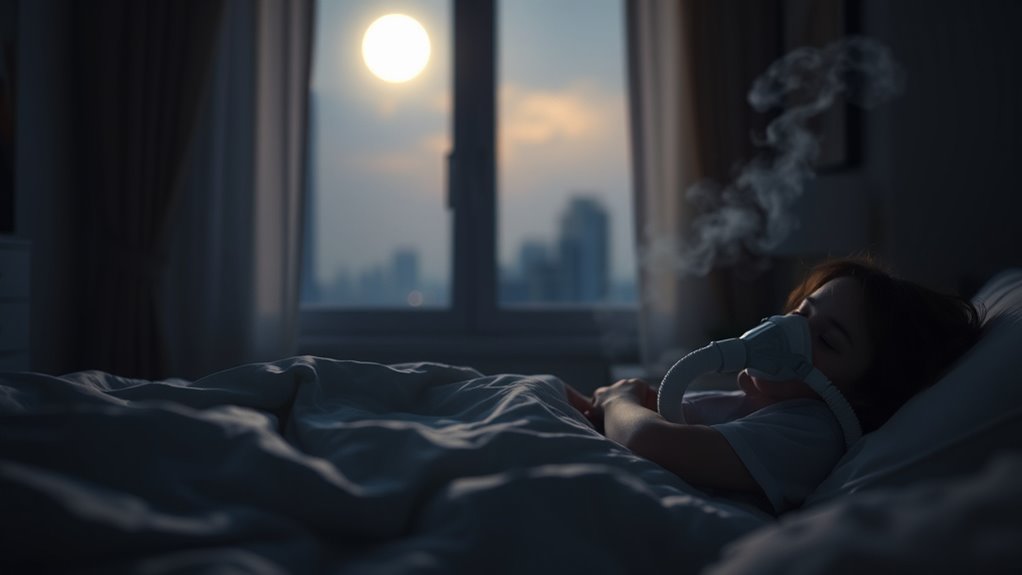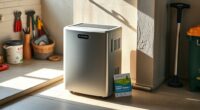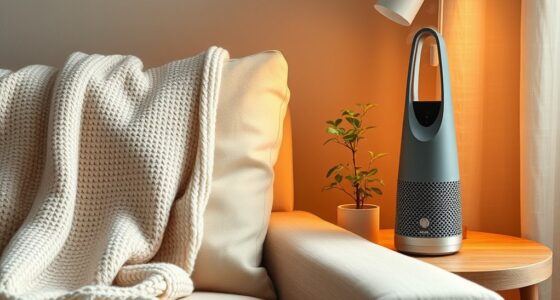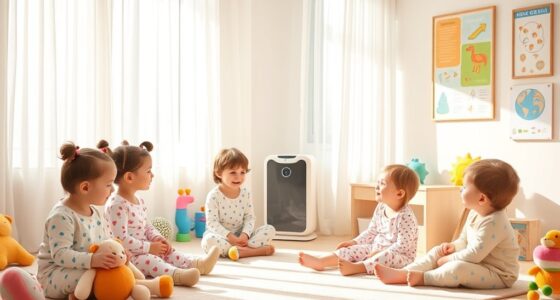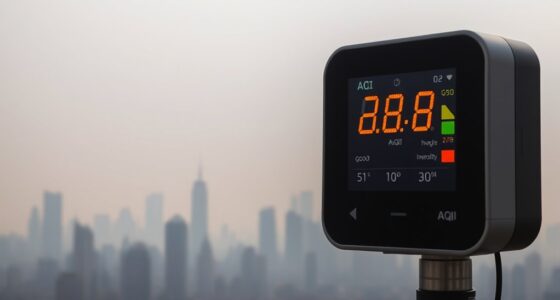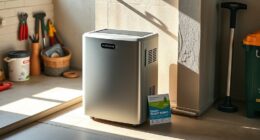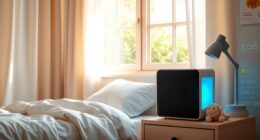Poor indoor air quality can worsen sleep apnea and snoring by irritating your airways and causing inflammation or congestion. Pollutants like dust, pet dander, mold, and VOCs can block airflow and increase airway narrowing during sleep. This makes it harder to breathe freely and can lead to louder snoring or episodes of apnea. By improving air quality, you may breathe easier and enjoy better sleep—discover more ways to boost your sleep health ahead.
Key Takeaways
- Poor indoor air quality causes nasal congestion and airway inflammation, increasing the risk of sleep apnea episodes.
- Airborne pollutants irritate the respiratory tract, leading to increased snoring due to airway narrowing.
- Elevated indoor pollutants can reduce airflow during sleep, exacerbating breathing difficulties associated with sleep apnea.
- Improving air quality decreases nasal obstruction, promoting clearer breathing and reducing sleep disturbances.
- Using air purifiers and proper ventilation creates a healthier environment, helping to minimize snoring and sleep apnea symptoms.
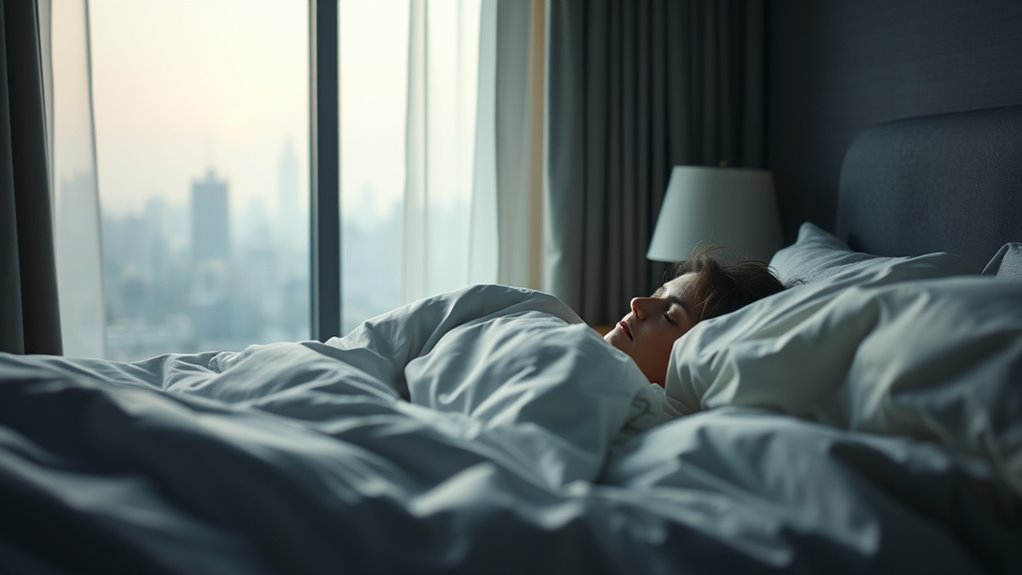
Poor air quality can considerably impact your sleep, especially if you suffer from sleep apnea. When the air around you is filled with indoor pollutants, it can worsen breathing problems and make restful sleep difficult to achieve. Indoor pollutants include dust mites, pet dander, mold spores, volatile organic compounds (VOCs), and tobacco smoke. These contaminants can irritate your airways, inflame nasal passages, and increase mucus production, all of which can exacerbate sleep apnea symptoms or cause more frequent snoring. Even subtle irritants in your environment can lead to airway narrowing, making it harder for you to breathe freely during sleep.
Indoor pollutants like dust, pet dander, mold, VOCs, and smoke can worsen sleep apnea and cause snoring.
Understanding air pollution effects is vital because they extend beyond outdoor environments. Indoor air can often be more polluted than the air outside, especially if your home isn’t well-ventilated or if you use certain household products. For example, air fresheners, cleaning supplies, and new furniture emit VOCs that can irritate your respiratory system. When these pollutants accumulate, they can cause inflammation and congestion in your nasal passages, reducing airflow and increasing the likelihood of airway collapse, which is central to sleep apnea episodes. The presence of indoor pollutants can also trigger allergic reactions, leading to nasal obstruction and further complicating breathing during sleep.
Poor air quality in your environment doesn’t just make breathing harder; it can also disturb your sleep cycles. Frequent awakenings caused by irritation or difficulty breathing prevent you from reaching the deep, restorative stages of sleep. This disruption leaves you feeling tired and unrefreshed in the morning, compounding the fatigue often associated with sleep apnea. Additionally, air pollution effects can intensify the severity of snoring, as nasal congestion and airway inflammation cause vibrations in the throat tissues, producing louder and more persistent snoring sounds.
Keeping indoor pollutants in check is an effective way to improve sleep quality. Using air purifiers with HEPA filters can markedly reduce airborne particles and allergens. Regularly cleaning your home, washing bedding, and maintaining low humidity levels can also prevent mold growth and dust buildup. Ventilating your space by opening windows when possible helps dilute indoor pollutants and refreshes the air you breathe. Additionally, maintaining proper ventilation is crucial because it continuously replaces contaminated indoor air with cleaner outdoor air. By minimizing these indoor pollutants, you’re not only protecting your respiratory health but also promoting better sleep and reducing the severity of sleep apnea and snoring episodes. Ultimately, paying attention to your indoor air quality creates a healthier sleeping environment, making it easier for you to breathe freely, sleep soundly, and wake up feeling more energized.
Frequently Asked Questions
Can Air Purifiers Completely Eliminate Sleep Apnea Symptoms?
Air purifiers can’t completely eliminate sleep apnea symptoms, but they can substantially improve air quality, which may reduce snoring and breathing issues. Their effectiveness depends on the device’s quality and filtration capabilities. By improving air quality, you might experience better sleep and fewer apnea episodes. Remember, though, sleep apnea often requires medical treatment, so consult a healthcare professional for extensive management beyond just using an air purifier.
Do Certain Pollutants Worsen Specific Types of Sleep Apnea?
Certain pollutants can worsen specific types of sleep apnea. For example, airborne allergens and irritants like dust or smoke may aggravate obstructive sleep apnea by inflaming airways, making breathing more difficult during sleep. Conversely, pollutants that impact respiratory control, such as carbon monoxide or nitrogen dioxide, could influence central sleep apnea by affecting brain areas responsible for breathing regulation. Being aware of these pollutant-specific effects helps you manage your condition more effectively.
Is There a Seasonal Variation in Air Quality Affecting Sleep?
Yes, seasonal fluctuations affect air quality and influence your sleep. During winter, pollutant patterns often worsen due to increased heating, trapping pollutants indoors and outdoors. Spring and fall may see cleaner air, while summer can bring elevated pollen levels. These seasonal variations can impact your breathing, snoring, and sleep quality. Staying aware of these patterns helps you take proactive steps to improve your sleep environment year-round.
How Quickly Can Improving Air Quality Impact Sleep Quality?
Improving air quality can lead to noticeable sleep pattern changes within days. As you enhance air quality through better ventilation, air purification, or reducing pollutants, your breathing becomes easier during sleep. This reduction in irritants can decrease snoring and sleep disruptions, making your sleep more restful. Keep in mind, consistent air quality improvement maximizes these benefits over time, promoting better overall sleep health and reducing sleep apnea symptoms.
Are Children More Vulnerable to Air Quality-Related Sleep Issues?
Yes, children are more vulnerable to air quality-related sleep issues because their child susceptibility and developmental vulnerabilities make them more sensitive to pollutants. Poor air quality can disrupt their breathing and sleep patterns, leading to issues like snoring or sleep apnea. You should guarantee good indoor air quality and limit exposure to pollutants, especially during sleep, to protect their developing respiratory systems and promote healthier sleep habits.
Conclusion
So, next time you notice your snoring or struggle to breathe at night, remember that air quality plays a vital role. By improving your environment, you’re not just avoiding a “speakeasy” of pollutants but also giving your body a fighting chance, much like a knight from medieval tales. Don’t wait for a dragon to awaken—take action now to breathe easier and sleep better, because your health deserves a hero’s touch.
